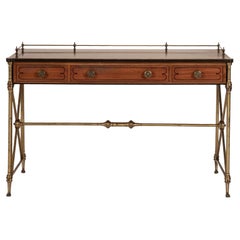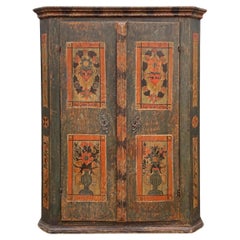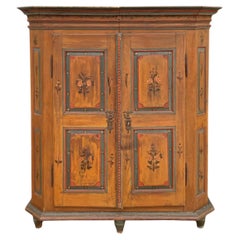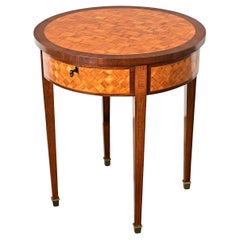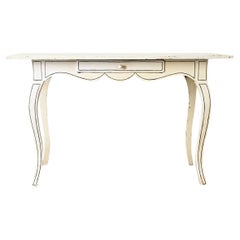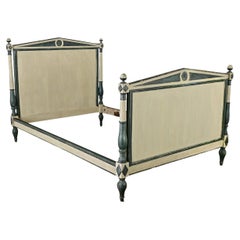Directoire Furniture
Formed in the wake of the Jacobin Reign of Terror’s bloody guillotine, the Directoire was established to lead France into order through the leadership of a five-member council of directors. It was brief, lasting only from 1795 to 1799, ending with Napoléon Bonaparte’s coup d’état, and was economically tumultuous. Yet it was an essential bridge between the era of Louis XVI and the elaborate Empire style that followed, with Directoire furniture and decorative arts shaped by a royal passion for classical design and an enthusiasm for postrevolutionary France.
Much of the country’s furniture production had halted during the French Revolution when the furniture guilds system was abolished, but during the Directoire period, the cabinetmakers restarted their businesses, such as François-Honoré-Georges and Jacob-Desmalter who established a new workshop called Jacob-Frères. Pieces made in walnut, elm, mahogany and other inexpensive materials incorporated influences ranging from Egypt to Pompeii, with popular forms including the curule armchair based on an ancient Roman design. The aesthetics of the transitional style were more austere than during the monarchy, with court cabinetmaker Jean-Baptiste Sené, for instance, reimagining his workshop’s neoclassical-style furniture with ungilded surfaces and a reduction of ornamentation.
Symbols referencing the revolutionary tenets of liberty, equality and fraternity were frequently carved into Directoire furnishings, such as the Phrygian cap, clasped hands and the fasces, which is an image of a bound bundle of sticks adopted from the Roman Republic, where it was seen as an emblem of strength through unity.
Elements of the French Directoire style continued through Empire style. Designers Charles Percier and Pierre-François-Léonard Fontaine are credited today as major proponents of both movements. The classically inspired furniture design is represented in pieces such as the boat-shaped daybed and the klismos chair, which endured in French interiors as well as in styles abroad, including American Directoire.
Find a collection of antique Directoire chairs, tables, daybeds, decorative objects and other furniture on 1stDibs.
Late 20th Century North American Directoire Furniture
Brass
1820s Italian Antique Directoire Furniture
Fir
Early 1800s Austrian Antique Directoire Furniture
Fir
20th Century French Directoire Furniture
Mahogany, Oak
18th Century French Antique Directoire Furniture
Pine, Paint
19th Century French Antique Directoire Furniture
Wood, Paint
2010s French Directoire Furniture
Glass, Lacquer, Oak, Cherry, Wood
1940s French Vintage Directoire Furniture
Walnut
Late 18th Century Italian Antique Directoire Furniture
Walnut
Early 2000s European Directoire Furniture
Brass, Stainless Steel
18th Century French Antique Directoire Furniture
Walnut
1840s Italian Antique Directoire Furniture
Fir
Late 18th Century French Antique Directoire Furniture
Wood, Paint
1940s French Vintage Directoire Furniture
Carrara Marble, Brass
19th Century French Antique Directoire Furniture
Velvet, Wood, Paint
Late 20th Century French Directoire Furniture
Bronze
Late 19th Century French Antique Directoire Furniture
Walnut
1970s French Vintage Directoire Furniture
Belgian Black Marble, Bronze
20th Century French Directoire Furniture
Glass, Wood, Mahogany
Mid-20th Century Italian Directoire Furniture
Marble, Brass
2010s American Directoire Furniture
Wrought Iron
1960s French Vintage Directoire Furniture
Brass
19th Century French Antique Directoire Furniture
Marble, Iron
1980s American Vintage Directoire Furniture
Fabric, Silk, Wood
1890s French Antique Directoire Furniture
Walnut
Late 20th Century Philippine Directoire Furniture
Brass
1970s French Vintage Directoire Furniture
Belgian Black Marble, Bronze, Steel
1980s Unknown Vintage Directoire Furniture
Cherry
Late 18th Century French Antique Directoire Furniture
Fabric, Textile, Upholstery, Wood, Paint
Late 19th Century Italian Antique Directoire Furniture
Wood
1970s French Vintage Directoire Furniture
Walnut
20th Century Directoire Furniture
Fabric, Oak
1960s Unknown Vintage Directoire Furniture
Carrara Marble
1960s Italian Vintage Directoire Furniture
Brass
1960s Vintage Directoire Furniture
Mahogany
Early 1900s French Antique Directoire Furniture
Cherry
Early 19th Century Italian Antique Directoire Furniture
Walnut
19th Century French Antique Directoire Furniture
Wood
1950s French Vintage Directoire Furniture
Walnut
Late 19th Century French Antique Directoire Furniture
Mahogany
19th Century French Antique Directoire Furniture
Brass, Bronze, Steel, Iron
19th Century French Antique Directoire Furniture
Stone, Marble, Metal, Brass
Early 1900s French Antique Directoire Furniture
Brass
1790s Italian Antique Directoire Furniture
Giltwood
1890s French Antique Directoire Furniture
Bronze
Mid-20th Century French Directoire Furniture
Steel, Bronze
19th Century Unknown Antique Directoire Furniture
Belgian Black Marble, Carrara Marble
1970s Unknown Vintage Directoire Furniture
Mirror
19th Century French Antique Directoire Furniture
Fruitwood
2010s American Directoire Furniture
Leather, Mahogany
2010s American Directoire Furniture
Brass, Wire
1940s French Vintage Directoire Furniture
Brass
18th Century French Antique Directoire Furniture
Gold
Late 19th Century European Antique Directoire Furniture
Cane, Wood
Late 20th Century American Directoire Furniture
Mahogany, Silk
Late 18th Century Italian Antique Directoire Furniture
Walnut
Early 19th Century French Antique Directoire Furniture
Wrought Iron
This exceptional pair of antique French cast iron vases originates from the heart of Paris, France. Crafted during the Directoire period (1770–1790), these urns showcase the elegance and craftsmanship of the era. The beautiful patina adorning the cast iron speaks to their historical authenticity. These timeless antiques are a testament to both functional design and aesthetic appeal from a celebrated period in European history.
The Rich Heritage of Antique UrnsThroughout history, antique urns and vases have been cherished across Europe for their exquisite craftsmanship and multifaceted functionality. Often serving as symbols of status and artistry, they were used to adorn gardens, courtyards, and stately homes. Made by skilled artisans, these pieces combined durability with intricate design, ensuring they could withstand the elements while remaining visually captivating. Today, their historical value and timeless appeal make them sought-after garden antiques.
Transforming Spaces with Antique UrnsThese antique garden planters...
18th Century French Antique Directoire Furniture
Iron
